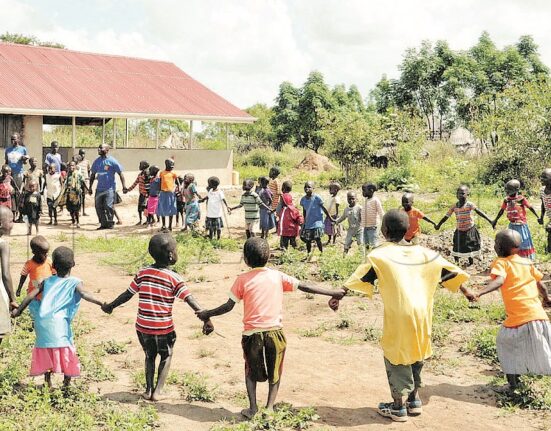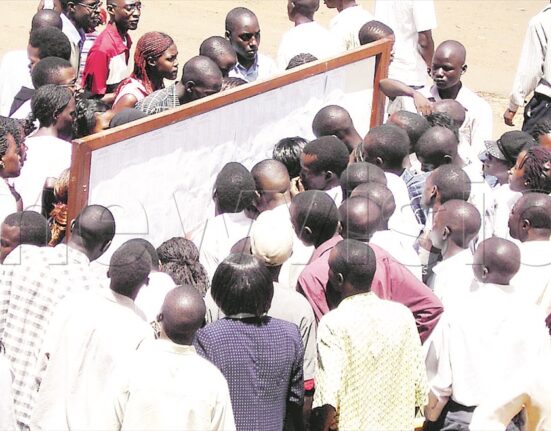
By Betty Angatai
Over the years, Namayingo district has been grappling with challenges in the education sector, water, sanitation and hygiene (WASH) in the fishing communities.
A number of children abandoned school to engage in fishing, gold mining and petty businesses. Others drop out due to lack of safe water, poor sanitation facilities, early marriages, teenage pregnancies and failure to maintain menstrual hygiene, among others.
Vincent Makali, the senior education officer, says 76% of the district is covered by Lake Victoria and 56 out of 84 government-aided primary schools are located in the fishing communities. He noted that most children from the fishing communities face a number of challenges that hinder their completion of the whole cycle of education.
According to the statistics from the district planning department, the primary level completion rate for boys in the year 2019 was at 31.2%, while that of the girls was 27.2%. Makali noted that the dropout rate is high, especially from the fishing communities.
He cited poverty, ignorance and low attitudes towards education, domestic violence, teenage pregnancies and early marriages as other causes of children dropping out of school. “Some girls in the fishing communities are lured into sexual activities and early marriages by the fishermen who give them money for survival,” Makali said.
He added that some parents tend to see their girls as source of wealth and thus marry them off at tender age. Rebecca Naigaga, a district councillor representing Lolwe Islands in Lolwe sub-county, pointed out the lack of a secondary school in the islands as one of the factors causing the drop outs.
ICELAND INTERVENES
In a bid to improve the education and to provide a conducive learning environment in the fishing communities, the government of Iceland last year embarked on construction of schools in the district.
According to Finnbogi Arnarson Rutur, the Iceland Embassy’s head of co-operation, the project dubbed Namayingo District Development Programme for Fishing Communities, is aimed at improving the quality of education and water, sanitation and hygiene (WASH) in the fishing communities.
“Most of the fishing communities are underprivileged and most pupils miss out education opportunities due to lack of facilities,” Rutur said.
Steven Lumala, the district co-ordinator for Namayingo district development programme for fishing communities, said the government of Iceland plans to improve all the 56 primary schools in the fishing communities, in phases.
The $8m programme for (2021-2023) aims at reducing poverty, improving livelihood quality of life for the poor population in fishing communities of Mutumba, Buhemba Banda.
“At least six schools are under construction for the period of 2021-2023,” Lumala said. The construction of Isinde Primary School in Buhemba, Buchumba Primary in Banda and Bumeru Primary School in Mutumba sub-counties has been completed.
BUMERU PRIMARY SCHOOL
At Bumeru Primary School, the scope of works included the construction of eight permanent classroom blocks, administration block that accommodates offices of the headteacher and senior male and female teachers and modern energy saving cooking stoves, among others.
James Wesonga, the headteacher of Bumeru Primary School, says the infrastructural development has increased student numbers.
“Our enrolment rose from 1,200 pupils in 2019 to 1,700 when the school re-opened in January,” Wesonga said.
ISINDE AND BUCHUMBA PRIMARY SCHOOLS
Isinde and Buchumba primary schools, each got four classroom blocks with 12 classrooms, administration block that accommodates offices and modern kitchen with modern energy saver cooking stoves, among others.
Wilber Egesa, the headteacher at Isinde Primary School, boasts of enough infrastructure. He says some learners used to study under tree shades while others in the Anglican Church at the school. He said the school’s enrolment rose to 862 pupils compared to 2019, where the school had only 538.
MORE SCHOOLS TO BENEFIT
The Iceland government has also started the construction of three more three primary schools of Bukewa, Mutumba and Busiro in the sub-counties of Banda, Mutumba and Buhemba. In these schools, 23 classrooms will be constructed and 22 classrooms renovated. The support will also include construction of sanitation facilities, staff quarters and installation of solar power.
According to Lumala, the construction works that commenced in February are expected to be completed in August.
Makali said in addition to construction of schools, the Iceland government is also supporting with textbooks, provision of scholastic materials and training of teachers, among others. The assistant District Health Officer, Matthias Mangeni commended the government of Iceland for designing a programme addressing the specific challenges affecting children in the fishing communities.
“The girl children will now remain longer in schools. This will lead to a decline on the issues of teenage pregnancies, where Namayingo is close to 30% in all antenatal care attendances,” Mangeni said.
Makali said prior to Iceland’s support, several initiatives by the district and other local NGOs had been done to keep girls in schools. He also said home visits, counselling and guidance have also been conducted to keep children in schools. He added that the district has also partnered with Forum for African Women (FAWE), a non-government organisation that is also boosting girls’ education, through bursaries to the best performing girls in sciences.
He said Water Solutions, an NGO, operating in the district is also empowering parents and children with messages on keeping girls in schools.
TEACHERS’ ACCOMMODATION
Ronald Sanya, the Namayingo district chairperson, says Iceland government has also constructed two staff houses, each with four units. The units accommodate eight teachers, altogether per school.
He said the intervention will address challenges of rampant absenteeism and late-coming of teachers in schools.
Moses Mayanja, the chairperson of school management committee at Isinde Primary School, says: “The teachers will now have enough time to engage with the learners. This will improve their academic performance.” He says previously the school had only one staff house that accommodated only two teachers.
HOME STUDY TEXTBOOKS
Makali says the Iceland government last year also distributed 38,000 home learning textbooks to pupils in the fishing communities in order to improve on their reading culture and performance.
“The books were distributed to learners in Primary Three to Primary Six,” Makali says, adding that the Iceland government is to procure more textbooks that will be distributed to pupils in Primary One Two and Seven.
TRAINING
The district Chief Administrative Officer, Edith Namayega, says Iceland government has contributed to the general capacity support of the district. “The district has received pre-programme support in institutional and human capacity building activities to address critical capacity gaps,” Namayega said.
In addition, a series of trainings aimed at enhancing capacities of the education department team, teachers and members of the school management committees (SMC) have also been conducted. Namayega also says Iceland unveiled plans to train teachers in order to adapt to the changing realities in education sector.
“We initiated teachers’ needs assessment to determine their (teachers) capacity gaps,” Namayega said adding that the assessment that was conducted last year by Mwalimu Educational Consult revealed that most teachers have limited foundational teaching approaches and professional skills.
Besides, the training programme, at least 60 teachers been selected to further their education in different universities.
NSITISATION PROGRAMMES
The Iceland government also embarked on sensitisation of the fishing communities on education, through conducting community sensitisation meetings, radio talk show programmes and trainings. According to locals, this has encouraged them to actively participate in education programmes.

OTHER INTERVENTIONS
VEHICLES AND EQUIPMENT
The district Chief Administrative Officer, Edith Namayega Namayega, says the district received a boost of four vehicles and eight motorcycles to improve on service delivery in communities. In addition, the district has also received two speed boats and an assortment of equipment that included 20 computers, printers and other office basic tools.
HEALTH SECTOR SUPPORT
The Iceland government donated a consignment of medical supplies and equipment worth over sh500m towards COVID-19 response. The equipment was aimed at boosting the fight against the spread of the coronavirus.
THE WASH PROJECT
So far, a total of 50 boreholes have been rehabilitated and 12 spring wells constructed to improve access to safe water.
“Water has been a challenge in this village. We have been drawing water from an unprotected well and in most cases sharing it with animals,” Hellen Nabirye, a resident of Banda says.
She says this will eliminate diseases, such as typhoid and diarrhea contracted from using contaminated water.
According to Joshua Wabusa, the district water officer, safe water coverage in the district stands at only 61%.
Robina Hope Mukisa, the former Member of Parliament for Namayingo district and an old girl of Isinde Primary School, commended the government of Uganda and Iceland for the developments in the district.
Mukisa said the initiatives have not only improved the education and WASH services, but have also created employment opportunities to the locals in addition to transformation of lives
WHAT PUPILS SAY
Kurusum Kimpiya, a pupil at Bumeru Primary School
We used to study under trees shades. We would miss lessons during the rainy seasons. With the construction of new classrooms, our education standards will improve.
Doreen Nabulange, a pupil at Bumeru Primary School:
I would miss school whenever I was in my menstruation periods. I found it difficult to attend lessons because we lacked space for changing. The school pit latrines were dilapidated making it hard to change pads.
Samadu Kakaire, a Primary Seven pupil
I abandoned fishing to focus on education. On a good day, I would earn between sh50,000 and sh90,000, but I stopped after listening to a radio talkshow on a local station.








Leave feedback about this